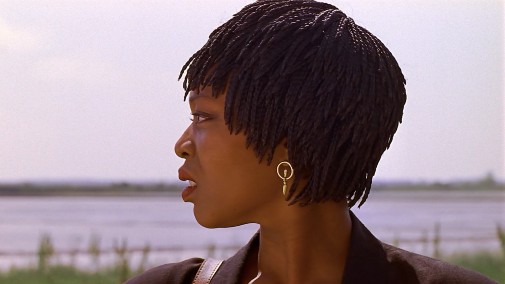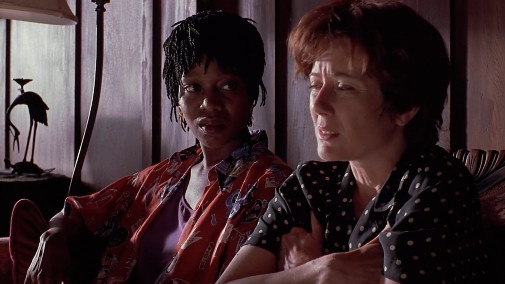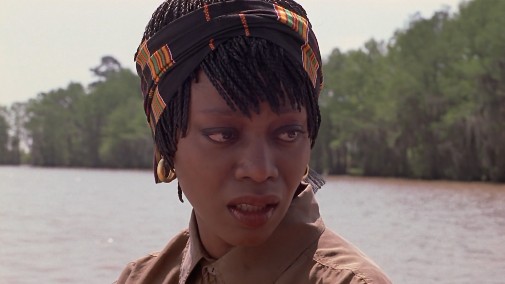
Alfre Woodard is one of the great American actresses of our time. If there were any doubts about that, last year's Clemency must have surely killed them for good. Still, for people obsessed with movie awards, Woodard's mastery might not be obvious. Her sole Academy Award nomination came in 1983 for a film that few remember, Cross Creek. The lack of recognition for that feature doesn't mean it doesn't deserve praise and it certainly doesn't reflect lackluster acting. But we're here to talk about a different performance.
The 1992 drama Passion Fish was up for Actress and Screenplay and it's easy to imagine that a third nomination for Woodard nearly materialized...

Directed and written by John Sayles, the film tells the story of two women stuck together by life's unexpected tragedies. The first one we meet is May-Alice Culhane, a soap opera star who's been involved in a violent car accident. In the aftermath, she lost mobility and feeling of the lower half of her body and has decided to get herself drunk on equal doses of self-pity and booze. Reluctant to hear her doctor's advice, she even goes back to her home state of Louisiana. Unemployed and desperately lonely, the actress wallows away in front of the TV, antagonizing her nurses in a cruel game of deliberate abrasiveness. That is until Chantelle arrives at her place.
She's May-Alice's new nurse and, for the first time, the wheelchair-bound thespian of day-time television seems to have found someone as stubborn as her. Cagey and resilient, the nurse slowly cracks the façade of prickly self-hatred worn by the other woman and the two learn to live together, one miserable step at a time. Passion Fish is made of two interlacing character studies, using the contrasts between the two women as well as startling similarities to investigate their inner lives, the way they are haunted by the past and prefer to either ignore or surrender to the challenges life puts in front of them. It's a tale of two women, two addicts, two complicated personalities that are never sugarcoated by the script or the actresses who play them.

In the role of the paraplegic actress, Mary McDonnel has the showier part, but that doesn't mean Alfre Woodard's Chantelle is short-changed. As the film goes along, it becomes more focused on the plight of the caregiver than the melodrama of her patient. Part of that comes from the way John Sayles' camera is positively besotted by Alfre Woodard's expressive countenance, staging entire scenes that hinge on the most minute movements of her face. Since Chantelle is a stubborn woman who insists on keeping things to herself, barely revealing anything about her life unless she's forced to, our awareness of her psychology depends heavily on the emotional information Woodard can wordlessly telegraph.

Thankfully, filling silences with a novel's worth of bruised feeling and challenging emotions is this actress's specialty. We can see that throughout her career, injecting a heartbreaking sense of tragedy into Tyler Perry movies, adding astringent complexity to Spike Lee's Crooklyn, making Clemency's last scenes into something out of a passion play directed by Dreyer. In Passion Fish, she isn't asked to go that far, but the modesty of these dramatic heights never stop Woodard from doing her best. Scenes of reluctant seduction, for example, could be an atonal bit of sexy comic relief. However, she makes them into little spectacles of intimacy and joy bursting through the concrete floor of Chantelle's stoic attitude.

Other great acting showcases are the final scenes of Passion Fish when Woodard is finally given some melodrama to bite into and delivers beautifully. Chantelle's past comes back to haunt her with sadness and guilt. Her drug addiction problems come to light and a daughter that now lives with her grandfather spends the summer with her mother. By the water, talking to her kid, Chantelle allows herself a moment of vulnerability and Woodard plays the scene with as much intensity as contention. She cries, she tenses up and she melts, she gives the audience a summary of the trials and tribulations of an estranged mother with just a handful of poignant stares and wavering line deliveries. Later, on a boat with May-Alice and contemplating the future, Woodard's even better.

It's not all made up of powerful silences, of course. Hell, Woodard even has a shouting scene in the middle of the film, when Chantelle has had enough of May-Alice's bitchiness after a day of self-imposed sobriety. That could have been her Oscar clip, but the Academy chose to ignore Woodard as they are prone to do. Curiously, despite getting less precursor attention McDonnell managed to get into the Best Actress lineup. Maybe the cause of such a snub was the unshowy nature of the part, maybe it was category confusion (despite winning the Spirit award for Best Supporting Actress, Woodard is a borderline lead), maybe it was too much competition.
Whatever the reason, Alfre Woodard should have more than a single Oscar nomination and it's a tragedy that she's stuck at one.